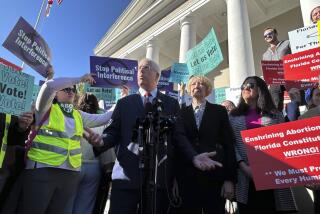Victims Seek Constitutional Amendment
- Share via
UPPER MARLBORO, Md. — George and Madeline Calloway thought their son’s killer would stay locked up for at least five years.
Instead, he spent 71 days in jail and was freed after a judge held a hearing to reconsider the sentence in the manslaughter case.
Nobody told the Calloways about the hearing. They were outraged that they didn’t have a chance to speak out against the release of Christopher Kelly in the 1993 shooting death of their 22-year-old son, Earl, in a quarrel over money.
The Calloways felt victimized again, this time by the criminal justice system.
“It’s like being raped over and over,” Madeline Calloway said.
The Calloways are among the ranks of violent crime victims disgruntled with a justice system that they believe gives more rights to defendants.
The only way to restore balance, advocates of victims’ rights say, is to guarantee in the U.S. Constitution that victims receive notification of all court proceedings and plea bargains and the opportunity to address the court at sentencing.
After persuading 29 states to adopt their own constitutional amendments, victims’ rights advocates are renewing their push to amend the U.S. Constitution. A coalition called the National Victims Constitutional Amendment Network is in the forefront of the drive.
Rep. Henry Hyde (R-Ill.), chairman of the House Judiciary Committee, has introduced the amendment in the House, but also has indicated that he may favor the more modest approach of changing existing law.
That route, Hyde said, “is a lot easier” than trying to amend the Constitution, which requires the approval of two-thirds of the House and Senate and 38 state legislatures.
Negotiators have been working privately to find common ground in wording the amendment. The proposal has gone through nearly 50 drafts in the Senate, partly aimed at winning the backing of Sen. Orrin Hatch (R-Utah), chairman of the Senate Judiciary Committee. The amendment is sponsored there by Sens. Dianne Feinstein (D-Calif.) and Jon Kyl (R-Ariz.).
The Calloways and other amendment supporters have allies in President Clinton and Atty. Gen. Janet Reno and backing by both Republicans and Democrats in their 1996 national platforms. In February, the National Governors’ Assn. endorsed the amendment.
In addition, the Oklahoma City bombing trial helped highlight some of the victims’ complaints. A Pennsylvania newspaper, The Mercury of Pottstown, launched a national drive this summer to gather 1 million signatures of support.
Despite such backing, the quest for a 28th Amendment won’t be easy.
“I think we can handle victims’ rights without having a constitutional amendment,” said Sen. Arlen Specter (R-Pa.), a member of the Senate Judiciary Committee. “There’s always a concern about trivializing the Constitution.”
Robert J. Humphreys, district attorney for Virginia Beach, Va., and a member of the victims’ rights working group for the National District Attorneys Assn., said defendants’ rights, such as prohibitions against unreasonable search and seizures, serve to protect all citizens.
“With victims’ rights, instead of restraining government, for the very first time you put into the Constitution a mandate that certain services be delivered,” Humphreys said.
Victims of the Oklahoma City bombing objected to moving the trial of Timothy McVeigh to Denver and were displeased with a federal judge’s order barring victims from watching the trials if they planned to testify during the penalty hearing.
“Victims have pretty much been treated as pieces of evidence,” said Marsha Kight, whose daughter was killed in the Oklahoma City bombing. “The defense has a lot more rights.”
A crime victims’ task force appointed by President Reagan first proposed a constitutional amendment in 1982. Its report concluded that victims were “oppressively burdened by a system designed to protect them.”
Paul Cassell, a law professor at the University of Utah, said only a federal amendment can make victims’ rights enforceable because courts often throw out cases involving state or federal law or a state constitution.
“We have wonderful paper guarantees for crime victims, but in Main Street U.S.A., their rights are sadly unenforceable,” Cassell said.
More to Read
Sign up for Essential California
The most important California stories and recommendations in your inbox every morning.
You may occasionally receive promotional content from the Los Angeles Times.













